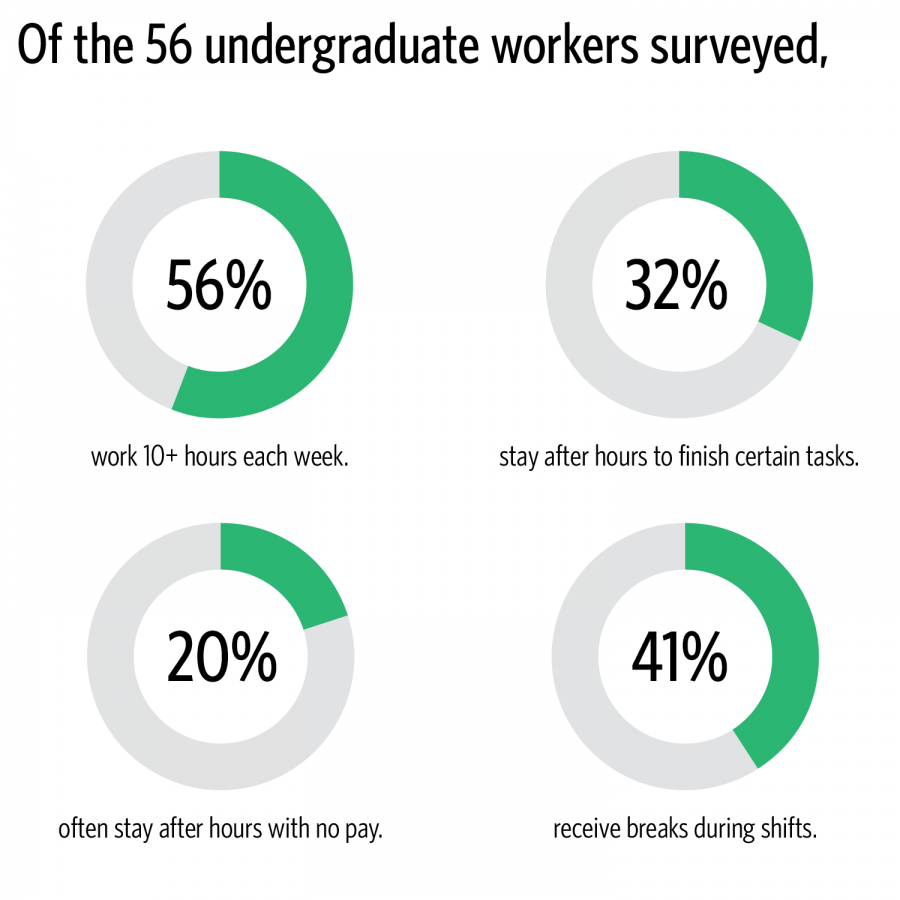Survey shows undergrad workers are unhappy with work conditions
Feb 13, 2018
Some undergraduate workers have shown dissatisfaction with their workplace, according to a recent survey published by the Undergraduate Alliance.
From October to November, Nick Goodell and Grant Neal, juniors in LAS and leaders of the UGA, waited outside of dining halls in order to talk to student workers and recruit participants for their survey. Although other types of workers were surveyed, dining hall workers made up 48 percent of the total 56 student workers that they polled.
“While we are actively seeking student feedback to improve upon our services and to benchmark our progress, it is a benefit to University Housing to receive supplemental data from external parties,” Chelsea Hamilton, senior assistant director for communications and marketing for University Housing, said.
Hamilton and the housing department were unaware of this survey being conducted, but the information adds valuable data to information University Housing has already collected, she said.
Neal said he worked for the dining halls for about six months before getting involved with UGA.
Get The Daily Illini in your inbox!
“I would say that I saw a good amount of shady things happen,” Neal said.
Goodell said he would hear stories from Neal that the working conditions were not the greatest.
“It (seems) kind of weird to us how unorganized the undergrad labor fund is on campus,” Goodell said.
The survey results showed 59 percent of workers are unhappy with their pay. Hamilton said most workers make around $8.75 to $15.00 per hour.
“Our wages are consistent with those across campus, and it is strategically designed that our starting wages are above the minimum wage,” Hamilton said.
The UGA’s research showed that although wages have not increased, the cost of living in Champaign-Urbana has.
“It is disturbing when you look at the data and when you combine it with just simple facts about living conditions in Champaign-Urbana,” Goodell said. “You realize how hard some people must be struggling just to simply live and go to school right now.”
Goodell said that the University of California, Berkeley has recently unionized their undergraduate workers and that he’s seen videos and stories of students who have been living out of their cars or do not have enough money to keep themselves healthy.
“There are concerns with (the) work environment, and if you feel that, you’re not alone,” Neal said.
Their survey results showed that about 59 percent of workers did not receive breaks during their shifts even after working ten or more hours a week.
Hamilton said that most shifts are around one to two hours long, and five minute breaks are permitted; students who do work five or more hours per shift are allowed a paid 15 minute break.
“Students are encouraged to take short breaks,” she said.
During Neal’s work experience, though, he said breaks were not common, and people would often take bathroom breaks just so they could sit down.
“It was just kind of this atmosphere that, every night, drags on forever,” Neal said.
Neal said he does not think the dining halls are healthy work environments due to an atmosphere of low morale. Student workers were also asked if they ever faced any form of harassment in the workplace. Sixteen percent said they had. While not every yes or no answer had an explanation, the ones that did usually had to do with management, Neal said.
“A few people just said bluntly, ‘I feel like I have been discriminated against in the workplace,’” Goodell said.
Hamilton said the sample size of the survey raised some concern.
“Such a small sample size significantly lowers the legitimacy that these survey results are representative,” she said.
Both Neal and Goodell said they would want to conduct the survey again for a bigger sample size and utilize better strategies when talking to and surveying workers.
Goodell would not expect the results to drastically change if more people were surveyed, he said. The goal of the survey is to raise awareness of the work conditions some students endure, but he is doubtful that the survey alone will result in some type of policy change anytime soon.
Hamilton said this survey has been studied and shared with colleagues, and they are going to continue to look into this study.
“This survey has been shared with our professional staff, and we are seeking ways that we can utilize this survey as opportunity for further analysis,” Hamilton said.






